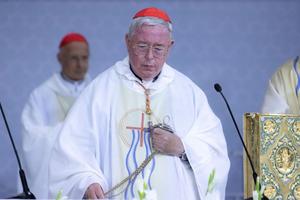Female Anglican Bishop Addresses Pope Francis’ Council of Cardinals
Rev. Jo Bailey Wells, as well as Salesian Sister Linda Pocher and consecrated virgin Goiliva Di Berardino of Italy, presented remarks on the subject of women in the Catholic Church.

VATICAN CITY — A female Anglican bishop who has campaigned for “gender equality” addressed the Council of Cardinals on Monday as part of a session dedicated to deepening a reflection "on the role of women in the Church.”
Rev. Jo Bailey Wells, who is deputy secretary general of the Anglican Communion, was one of the first generation of women to be ordained a vicar in the Church of England in 1995. Married to an Anglican clergyman with two children, she has also served as chaplain to the Archbishop of Canterbury.
The Anglican bishop, who in the past has praised “gender history” for highlighting how “institutions are gendered and how institutions gender individuals,” also addressed an interreligious meeting attended by Pope Francis in Kazakhstan in October 2022 when she reportedly said “gender equality is part of God’s plans.”
The Council of Cardinals, also called the “C9,” is a group of nine cardinals Pope Francis established in 2013 to advise him on Church reform and governance. One of its main tasks, to advise the Pope on reforming the Roman Curia, led to the 2022 apostolic constitution Praedicate Evangelium (Preach the Gospel). It has also often brought in guest speakers to address the Pope and cardinals on key themes.
Vatican spokesman Matteo Bruno said on Monday that as well as Bailey Wells, Salesian Sister Linda Pocher, a professor of Christology and Mariology at Rome’s Pontifical Faculty of Educational Sciences’ “Auxilium,” and Giuliva Di Berardino, a consecrated virgin and liturgist from the Diocese of Verona, Italy, shared interventions on the subject of women in the Church.
The Vatican has not released information on today’s discussions nor published the texts of any presentations made at the meeting, but it comes after the issue of women priests and deacons became a particular focus of the first assembly of the Synod on Synodality last October.
Sister Linda, who has addressed the C9 on previous occasions on the same theme, said in a Dec. 16 interview with Vida Nueva that “the truth is that women have always been active and present in the Church. However, in almost all contexts, more or less aggressive forms of machismo or clericalism continue to be found.”
Sister Linda is an advocate of the “Marian Principle” in the Church, a theory originally deriving from the 20th-century theologian Hans Urs von Balthasar, who hoped to have the primacy of the Catholic Church accepted by all Christian denominations on the basis of the integration of the Petrine ministry into Marian mysticism.
“The merit of reflecting on the ‘Marian principle’ is to help the ecclesiastical hierarchy to remember that the Church is not only an institution (‘Petrine principle’), but also mysticism, spirituality, love,” Sister Linda said.
Synod delegates were divided over the theme of women deacons but agreed to continue theological study of the possibility of a female diaconate, and for the results of such a study to be shared at the next session of the Synod on Synodality, to be held this coming October.
Pope Francis has often chosen to stress the feminine dimension of the Church, recently calling for more women in ecclesiastical governing positions, and telling members of the International Theological Commission last November to “demasculinize the Church.’”
At the previous C9 meeting in December when the subject of women in the Church was also discussed, the cardinals concluded there was a “need to listen, also and above all in the individual Christian communities, to the feminine aspect of the Church, so that the processes of reflection and decision-making can enjoy the irreplaceable contribution of women.”
Cardinals Ambongo and Lacroix
Among the nine cardinal members present at the meeting which runs until Wednesday is Cardinal Fridolin Ambongo Besungu of Kinshasa. The cardinal led a Jan. 11 response from all the bishops’ conferences of Africa to the Vatican declaration Fiducia Supplicans (Supplicating Trust), which said the blessing of same-sex couples proposed in the document would not be allowed in Africa and that such unions are “contrary to the will of God.”
The statement, which said the declaration had “caused a shockwave” across the continent, was written after Cardinal Ambongo flew to Rome to discuss the fallout with Cardinal Victor Manuel Fernández, the Vatican’s doctrinal chief and main author of the document, and Pope Francis.
Cardinal Ambongo said in a later, Jan. 25 interview, that Fiducia Supplicans “brought discredit to the synod, to synodality,” adding that the declaration was made to appear as a “fruit of the synod, when it had nothing to do with the synod.” It came at a time when, as Jonathan Liedl reports in a Feb. 1 Register article, African Catholics are ready to make their voices heard in the wider Church as Western culture becomes increasingly dominated by secular ideologies.
Other members of the C9 are Cardinals Pietro Parolin, Vatican secretary of state; Fernando Vérgez Alzaga, president of the Pontifical Commission for Vatican City State and the Governorate of Vatican City State; Oswald Gracias, archbishop of Bombay; Seán O'Malley, archbishop of Boston; Juan José Omella Omella, archbishop of Barcelona; Jean-Claude Hollerich, archbishop of Luxembourg; and Sérgio da Rocha, archbishop of San Salvador de Bahia. The secretary is Bishop Marco Mellino, titular bishop of Cresima, in North Africa.
Also present at Monday’s meeting was Cardinal Gérald Lacroix of Québec, who was recently accused of inappropriately touching a 17-year-old girl on two occasions in the 1980s. In a video message released on Jan. 30, he said he would “temporarily withdraw from activities in my diocese.” The cardinal “categorically denies” the allegations and said that “my soul and my conscience are at peace when it comes to those accusations.”
- Keywords:
- council of cardinals


















